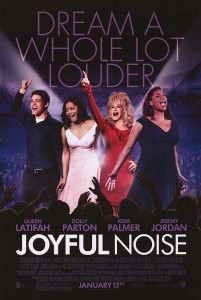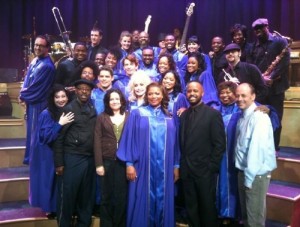Interview: Writer-Director Todd Graff of ‘Joyful Noise’
Posted on January 11, 2012 at 8:00 am
 I love Todd Graff’s first two films, Camp and Bandslam. Both were fresh and warm-hearted stories about teenagers who are passionate about music and performing, inspired by his own experiences as a theater-mad kid. His new film, “Joyful Noise,” has Dolly Parton and Queen Latifah as warring gospel choir leaders, and again he deftly manages to make the audience care about a group of exceptionally appealing characters and fills the theater with heart-lifting musical numbers. It was a real pleasure to talk with him about growing up listening to his mother rehearsing the Hadassah choir in his home and his surprise homemade gift from Ms. Parton.
I love Todd Graff’s first two films, Camp and Bandslam. Both were fresh and warm-hearted stories about teenagers who are passionate about music and performing, inspired by his own experiences as a theater-mad kid. His new film, “Joyful Noise,” has Dolly Parton and Queen Latifah as warring gospel choir leaders, and again he deftly manages to make the audience care about a group of exceptionally appealing characters and fills the theater with heart-lifting musical numbers. It was a real pleasure to talk with him about growing up listening to his mother rehearsing the Hadassah choir in his home and his surprise homemade gift from Ms. Parton.
The closing credits of the film pay tribute to your mother’s work as a choir leader for the Jewish women’s group Hadassah.
It may seem strange, but Queen Latifah’s character is really based on my mother.
Not strange at all! I think this is her all-time best performance, and I loved the scene where she tells her teenage daughter a few things about what beauty means.
When Dana signed on to do the movie, I had not even written that scene yet. After she joined, I said, “I want to see Dana do what Dana does!” And that’s when I wrote that scene.
Tell me more about your mother.
My mom was an amazing woman. She was a housewife but she had a degree in music and taught piano.
She was a singer and a choirmaster and a community activist. She was always down in the basement at the mimeograph machine running off handbills to hand out. I would wake up and there would be a blind child there and she would say, “You should hang out.” She just thought he could use a friend. The bad thing is that it’s a lot to live up to. One of the things she did was she had these ladies in the choir over to the house twice a week, Tuesdays and Thursdays for my whole childhood, and she was really tough on them. For an amateur choir, where the most they would do was perform in a nursing home, she still treated them like professionals. The line in the movie where Queen Latifah’s character says, “You have to look at me because Jesus doesn’t know where the cut-offs are” — that is my mom. She’d say, “I’m thrilled that you’re into it but God doesn’t know where the cut-offs are.” I couldn’t get her voice out of my head and this movie really took shape around that voice.
This is your third film in a row featuring teenagers. What is it that appeals to you about featuring kids that age?
In all honesty, it just started out, as so much of my life, as fear-based. They wouldn’t know if I knew what I was doing or not. My first movie none of the kids had even been in a movie before so I thought I was safe. I seem to have enough of an arrested maturity level that we could communicate well and those stories interested me.
Tell me how you go about casting a film like this.
In my movies, you have to sing and dance so I won’t read anyone until after the choreographer has winnowed down the people who audition to the ones who can dance and musically we have narrowed it down to the ones who can handle the singing. So that gets rid of two-thirds. Of that last third, even though I’m a big rehearsal guy and we rehearsed for a month on this, you don’t have a lot of time. I don’t have the time to break kids of entrenched bad habits. So I look for kids who are as natural as I can find while still having some degree of chops. They have to be directable. Because it is a musical and the musical numbers take up a big chunk of time that non-musical movies don’t have to worry about, I can’t just have the kid that you discover and has a quality but hasn’t done anything before. I want someone who is honest and true and real but can hit a mark and stay in their light and talk to another actor believably.
The music in the movie, as in any religious setting, is half worship and half performance.
It’s a changing world and the influence of secular music and other forms of expression in sacred music is where we are now. I did a ton of research and I would see huge gospel competitions in 18,000 seat arenas sold out. There was praise dancing and stand-up comics did religious themed material. There still is old-school traditional gospel and there will always be. But I was interested in a character who introduces the concept of change with a character who has to feel in control of everything because she feels if she lets one ball drop everything is going to fall apart. As it is, she’s treading water right up to her nostrils. So this is the last straw. She feels: “If you’re going to change what I do in church on top of everything else, I’m not going to be able to take it.”
Queen Latifah’s character has a son on the autism spectrum. What led you to include that kind of disability in the film?
Autism is an umbrella term and a broad spectrum. This version of Asperger’s is about the inability to understand social cues and so it makes contact difficult, difficult to connect with the community and with family even. He won’t even allow his mother to hug him, even his father in the big emotional moment of the movie, dad can’t hug him. That is very dramatic to me and germane to the stuff the movie is trying to talk about.
You worked with two very different ladies in this film. What was it like to direct Queen Latifah and Dolly Parton?
Not as different as you might imagine! But of course Dolly is her own special creation. God bless her, I worship the ground she teeters on in those eight inch heels. Precious! She gets up an hour early no matter what time her call is and she cooks breakfast for everybody — pancakes, grits, eggs. I would have a Hershey bar in the afternoon when my energy was down. She came in one morning with four pounds of fudge in Tupperware she stayed up all night making. She said, “I know you like your chocolate but I don’t want you eating that junk! This is made with real milk and real butter and a whole lot of love and if you finish this, I’ll make you some more.” She is real. And Dana is also incredibly generous as an actor, as a person, kind to the extras and the crew. She and Dolly had a love-fest. They were a joy. They’re both real church girls, so they share that. They both wanted to make a movie that uplifted people and touched people. They saw it from the beginning as more than a comedy piece — it was really important to them that the message be evident.
We had no drama, no complications all through the movie and post-production. It was almost too good to be true. And then the tragic thing is that after it was all over Joe Farrell died. Really really terrible and sad.
And Dolly Parton wrote some of the songs in the movie?
She wrote three songs for the film. She would write them and send them to me with very elaborate demos, full orchestration. And I would say to her, “This is great but for the scene in the movie you’ve written a song in 2 and I need one in 4 and you have a walking bass line and I need –” and she would say, “Honey, I don’t know what you’re talking about.” She can play 12 instruments but she can’t read music. She would say, “If you don’t like it, I’ll write another one. It only takes me an hour.” I’d say, “Why don’t we just fix this one?” She said, “No, I’ll write another one.” She ended up writing 12 songs and said she would use all the other ones somewhere else.
What was your biggest challenge?
The big concert sequence because I only had four days to film three musical numbers with all the extras and all the backstage scenes, the cafeteria stuff, and kids who can’t work full hours. There is not a single real choir in the movie. I cast all those people and put them together. Mervyn Warren and I turned them into choirs.
Why is choir music so moving?
Someone said that one star is just a star but many stars is a constellation. You can’t harmonize by yourself. When you can be part of a whole that creates such a gorgeous, layered, powerful, communal experience you are part of something that makes you feel more connected to the world and less alone.

Thanks for bringing this to our attention. This sounds like a more genuine movie than the typical manipulative Hollywood movie fare. If his movie is as funny as this guy is (“I worship the ground she teeters on in those eight inch heels”)we will enjoy it.